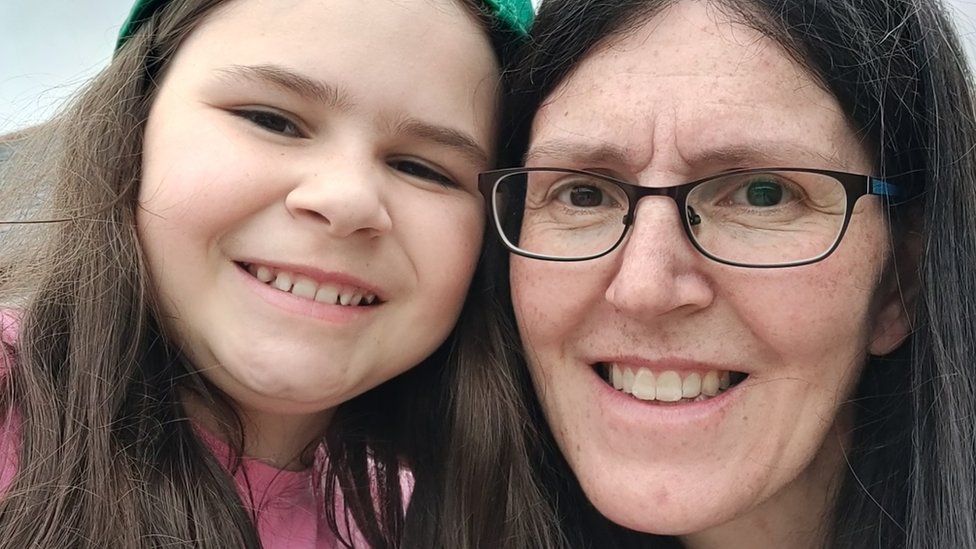ARTICLE AD BOX
 Image source, Lorna Glasgow
Image source, Lorna Glasgow
Caitlin was always up early, going "a hundred miles an hour" before getting Covid, her mum said
By Auryn Cox
BBC Scotland News
In September 2021 Caitlin Glasgow, then 10-years-old, was diagnosed with Covid. She never fully recovered.
"The rest of Caitlin's classmates all returned to school after isolating for 10 days, but she was still in bed after six weeks," recalls her mother Lorna.
Lorna believes her daughter has long Covid. She is one of 175,000 people in Scotland who say they are still affected by the illness.
Most people who catch Covid do not become severely ill and get better relatively quickly.
But some have long-term problems after recovering from the original infection - even if they were not very ill in the first place.
Lorna, who lives in Penicuik in Midlothian, said her local GP was helpful and concerned for Caitlin, but it has been difficult to understand why she hasn't recovered like her friends.
"She still gets pains in her legs, that's probably the worst thing along with the fatigue. There's breathlessness, chest and tummy pain, brain fog and she gets quite light-headed at times."
Although Caitlin has returned to school her mum judges her attendance on a day-to-day basis.
"I take her to school some days and I come home sobbing because I'm thinking I shouldn't have taken you in today," she said.
Lorna believes there needs to be more awareness of the condition, to tackle the stigma around people with long Covid.
She said: "Caitlin's friends have sort of gotten fed up hearing the term 'long Covid'. She's been asked many times, have you still got that?
"They're just kids so you kind of understand, but some of the hateful and horrible comments you read online from adults even, are really cruel.
"When you're living in the middle of it and you see how difficult and real it is - for other people to say 'what a pile of nonsense' it's really disheartening."
A report published by a Scottish government committee said tackling the stigma around long Covid needs "urgent" action.
The Covid-19 recovery committee has outlined a raft of measures to improve awareness of the condition among healthcare professionals.
Image source, Heather Swanson
Image caption,Abigail Swanson loved going to school but has not attended since getting Covid in 2021
It is an issue that Heather Swanson feels strongly about.
Heather, who lives in East Dunbartonshire, was a teacher before becoming a full time carer to her 16-year-old daughter Abigail.
She says she has found it hard to convince medical experts her daughter has long Covid.
"She's been bed-bound for a year now, but was first diagnosed on September 6 2021, that's when our lives changed forever," she said.
"Abi was told it was a psychological problem, she was told several times she could get better if she wanted to. She ended up getting so bad she could no longer talk or barely move. We thought she was going to die."
Heather believes this was caused in part by a lack of knowledge and awareness among healthcare professionals in Scotland.
"I feel people who have been seeking help for long Covid have been dismissed again and again."
The Covid-19 recovery committee heard from academics, clinicians and those living with long Covid throughout the four-month inquiry.
One of its recommendations is for a single point of contact for long Covid in every health board, to provide a more consistent approach.
Committee convener Jim Fairlie said he was "deeply saddened" to learn of the stigma facing those with the debilitating condition.
He said he was worried about "the impact this lack of awareness can have on people's mental health and wellbeing, their educational and employment opportunities and their overall quality of life".
Image source, Kate Stott
Image caption,Kate Stott misses being able to pick up her three children from school and drive a car
Kate Stott from Aberdeen went to a clinic in Germany last year to receive trial drugs in the hope they could help treat the symptoms of her long Covid, spending tens of thousands of pounds in the process.
"We have no support for long Covid, there was nobody I could speak to about my symptoms in terms of how to manage them, " she said.
"In Germany I was diagnosed with vascular damage and micro clots which mean my blood is thicker than normal. My blood tests are still showing abnormalities, it's opened up a whole host of health problems that I didn't think I would have at the age of 36."
Kate who is a mother of three and won Scottish business woman of the year in 2019, said that long Covid had been a "hidden epidemic" but she is seeing some signs of change.
"People are beginning to be taken more seriously than what's happened in the past," she said.
"However, it's not good enough. We're three years down the line, people have lost their jobs, homes and long Covid is still not classed as a disability."
"That said, others with long Covid need to not lose hope. We have to take each day at a time and help will come."
The Scottish government said it recognised the significant impact that long Covid can have on the health and wellbeing of those most severely affected across Scotland.
"We welcome the committee's consideration of this very important issue and will consider the report and its recommendations in full," a spokesman said.
"In the meantime, we are making available £3m from our £10m long Covid Support Fund over this financial year to support NHS boards to increase the capacity of existing services supporting those with the condition, develop these into more clearly defined local pathways and provide a more co-ordinated experience for those accessing support."

 2 years ago
71
2 years ago
71








 English (US) ·
English (US) ·